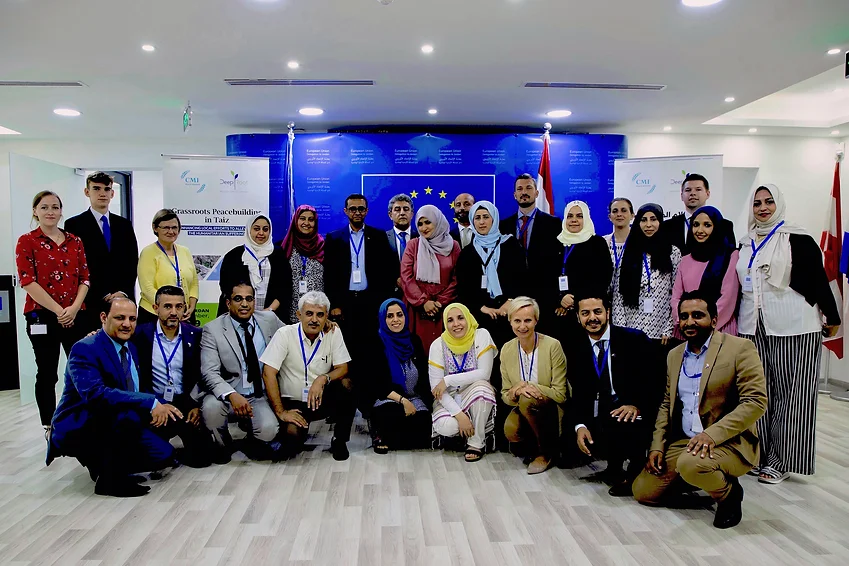Yemeni civil society and private sector leaders gathered in Amman this month for a workshop on grassroots peacebuilding in Taiz, seeking to enhance local efforts to alleviate the humanitarian suffering in the governorate. DeepRoot convened the workshop with its implementing partner Crisis Management Initiative (CMI), as part of the European Union IcSP-funded project Supporting Inclusive Peacemaking Efforts and Political Transition in Yemen.
Despite the devastation, Taiz continues to be home to a rich and active civil society. Social activists and community leaders both in Taiz and abroad have long been working hard to renew a culture of coexistence and bolster ceasefire and other de-escalatory measures during the ongoing conflict. These peacebuilders, however, often remain isolated from decision making processes and lack safe, neutral spaces to coordinate their work with wider networks, be it across sectors or with different demographics, especially youth.
In order to provide such a venue for experience sharing, improve coordination and highlight the existing opportunities to advance their shared agenda of easing the humanitarian situation in Taiz, a diverse range of civil society, women and youth leaders, and community-oriented businesspeople from Taiz convened in Amman on September 1 and 2. Hosted by the European Union Delegation, the workshop reached 50 percent participation of women, reflecting the strong role women are playing at the forefront of peacebuilding efforts in Taiz, as well as the EU and implementing partners’ commitment to supporting gender equality.
Bottom-up, locally-driven initiatives can play a strong complementary role parallel to more formal and political efforts to ease the humanitarian suffering in Taiz, including via the UN-sponsored track that followed the Sweden Consultations. Special Envoy Martin Griffiths referenced this in his July briefing to the UN Security Council, saying “I hope also that Taiz could benefit from the support of local led community initiatives to bridge the divides of war.” Alongside the European Union Delegation to Yemen, the Special Envoy attended the workshop and presented an overview of the ongoing national peace process and emphasized the role of civil society leaders in Taiz in leading the charge toward peace.
Following the workshop, the Special Envoy commended the participants in his September 16 briefing to the UN Security Council, adding that he has not given up on efforts to help the people of Taiz. “But I want to do this primarily now through support for the local community and for women’s groups and local groups that have always been so active on the same issues in Taiz and who came together and I was privileged to meet them in a seminar hosted by the European Union in Amman a few weeks ago,” he said. “The energy, and the creative will and the desire to improve the conditions of families and civilians as represented and exemplified by those groups is a remarkable energy and I would like to associate myself in support of it.”
The participants discussed the current situation in Taiz and reviewed the multitude of efforts that have been expended since 2015 to ease the humanitarian suffering, including initiatives and campaigns centered on opening road access, facilitating prisoner exchanges, and improving social cohesion. Conflict mediation and security sector reform experts from the European Union and Office of the Special Envoy shared their international experiences and expertise, before the participants turned their attention toward the future and developed community-led initiatives to tackle the most pressing issues facing civilians in Taiz.
Throughout the discussions, many participants pointed out that small successes are being achieved on the ground, even if they go unnoticed by national and international stakeholders, or overshadowed by the failure of larger agreements. For example, prisoner exchanges continue to take place on an ad-hoc basis, facilitated entirely by local mediators in Taiz. Though small in scale, these have resulted in the release of hundreds of prisoners, bringing relief to thousands of family members and building a degree of trust between local peacebuilders and the warring parties. With this in mind, the peacebuilders developed strategies to more effectively capitalize on the opportunities that currently exist, and provided insight to the international stakeholders on where their support can be most productive.
Supporting Inclusive Peace-making Efforts and Political Transition in Yemen, funded by the European Union Instrument contributing to Stability and Peace (IcSP) and implemented in partnership between DeepRoot and CMI, is designed to provide flexible and effective support to peace efforts and the ensuing political transition in Yemen, and to contribute to restoring a culture of dialogue for the resolution of disagreements ahead of and during a potential peace process.
DeepRoot Consulting is a consulting firm that is focused on development issues in Yemen. DeepRoot aims to provide assistance to international development actors, the private sector, local civil society organisations and the Yemeni Government in order to anchor their interventions in a deep understanding of Yemen’s national and local contexts, and international best practices. DeepRoot's management and advisory board has a long working experience in Yemen in the public, private and non-profit sectors.
Crisis Management Initiative (CMI) is an independent Finnish organisation, founded in 2000 by former President and Nobel Peace Prize laureate Martti Ahtisaari. CMI works to prevent and resolve violent conflicts through informal dialogue and mediation, based on the principles of honest mediation, local ownership, inclusiveness and complementarity. The organization has grown since its establishment to become one of the leaders in this field.
This project is funded by the European Union
